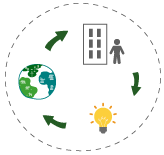
How does Recycling help mitigate climate change?
What is recycling?
Recycling is a process in which used or discarded materials are collected, processed, and transformed into new products to be used again. The aim of recycling is to reduce waste, conserve resources, and minimize the environmental impact associated with the production and disposal of materials.
Recycling involves several steps:
1. Collection: Used materials, such as paper, cardboard, plastic, glass, and metal, are collected from households, businesses, and public spaces through recycling bins and collection programs.
2. Sorting: Collected materials are then taken to recycling facilities where they are sorted by type. This process ensures that different materials are separated to facilitate their proper recycling.
3. Processing: Once sorted, the materials undergo processing to clean and prepare them for recycling. For instance, paper and cardboard may be shredded and mixed with water to create a pulp, while plastics and metals are melted down and shaped into new forms.
4. Manufacturing: The processed materials are then used in the manufacturing of new products. For example, recycled paper can be used to make newspapers, tissues, and packaging materials, and recycled plastic can be used to produce new bottles, containers, and various other plastic products.
What are the top 10 things that can be commonly recycled?
The list of top 10 things that can be recycled may vary slightly depending on the recycling facilities and practices available in different regions. However, here are some common items that are widely recyclable:
1. Paper: This includes newspapers, magazines, office paper, cardboard boxes, and other paper-based materials.
2. Cardboard: Corrugated cardboard boxes and packaging materials can be recycled.
3. Plastic Bottles: Most plastic bottles, such as water bottles, soda bottles, and milk jugs, can be recycled.
4. Aluminum Cans: Beverage cans made of aluminum are highly recyclable.
5. Glass Containers: Glass bottles and jars can be recycled repeatedly.
6. Steel Cans: Cans used for food, beverages, and other products made of steel can be recycled.
7. Plastic Containers: Many plastic containers, such as yogurt cups, shampoo bottles, and detergent bottles, can be recycled.
8. Electronics: E-waste, including old computers, cell phones, and other electronic devices, can often be recycled.
9. Batteries: Rechargeable and single-use batteries can be recycled to recover valuable metals.
10. Clothing: Some textiles, such as clothing and shoes, can be recycled or repurposed to reduce waste.
It’s essential to check with your local recycling program or facilities to ensure that these items are accepted and properly sorted for recycling. Additionally, proper preparation, like rinsing and removing caps, can help improve the efficiency of recycling processes. Remember that reducing consumption, reusing items, and making sustainable choices are also crucial steps in minimising waste and preserving resources.
How does recycling help mitigate climate change?
Recycling plays a significant role in mitigating climate change and reducing greenhouse gas emissions. The process of recycling various materials offers several environmental benefits that contribute to climate change mitigation:
1. Reduced Greenhouse Gas Emissions: Recycling reduces the need for extracting, processing, and manufacturing products from virgin materials. The production of goods from raw materials often involves energy-intensive processes that release greenhouse gases (GHGs) like carbon dioxide (CO2) into the atmosphere. By recycling materials, we can significantly decrease the carbon footprint associated with manufacturing, which helps mitigate climate change.
2. Energy Savings: Recycling generally requires less energy compared to producing items from raw materials. For example, recycling aluminum cans requires about 95% less energy than producing aluminum from bauxite ore. Similarly, recycling paper saves energy compared to making paper from trees. Lower energy consumption translates to reduced carbon emissions from power generation and industrial processes.
3. Landfill Methane Reduction: When organic waste, such as food scraps and yard trimmings, is sent to landfills, it decomposes anaerobically, producing methane—a potent greenhouse gas that is significantly more effective at trapping heat than CO2. By recycling organic waste through composting or anaerobic digestion, methane emissions can be minimized, thus helping to combat climate change.
4. Preservation of Forests: Recycling paper products reduces the demand for virgin pulp from trees. Forests act as carbon sinks, absorbing CO2 from the atmosphere. Preserving forests through recycling helps maintain these carbon-absorbing ecosystems and their climate-regulating functions.
5. Avoidance of Mining and Extraction: Recycling metals like aluminum, copper, and steel avoids the need for extensive mining and extraction of ores. Mining processes can result in habitat destruction, water pollution, and energy consumption, leading to increased greenhouse gas emissions.
6. Waste Reduction: Recycling diverts waste from landfills, reducing the methane emissions associated with organic waste decomposition. Additionally, it helps minimize the need for new landfills, which can generate methane emissions over time.
7. Reduced Incineration: In some cases, waste that cannot be recycled may be incinerated for energy recovery. Incineration emits CO2 and other pollutants, and by recycling, the amount of waste sent for incineration can be reduced.
Overall, recycling contributes to a more circular economy, where materials are reused and repurposed, reducing the need for resource extraction and minimizing the environmental impact of consumption. By participating in recycling programs and promoting responsible waste management practices, individuals, businesses, and governments can actively contribute to climate change mitigation efforts and work towards a more sustainable future.

